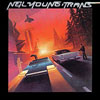NEIL YOUNG : TRANS
- Little Thing Called Love
- Computer Age
- We R in Control
- Transformer Man
- Computer Cowboy
- Hold on to Your Love
- Sample and Hold
- Mr. Soul
- Like an Inca
Label : Geffen Records
Release Year : 1982
Length : 44:26
Review (AllMusic) : When it was released, Trans was Neil Young's most baffling album. He had employed a vocoder to synthesize his voice on five of the album's nine tracks, resulting in disembodied singing, the lyrics nearly impossible to decipher without the lyric sheet. And even when you read the words, "Computer Age," "We R in Control," "Transformer Man," "Computer Cowboy," and "Sample and Hold" seemed like a vague mishmash of high-tech jargon. Later, Young would reveal that some of the songs expressed a theme of attempted communication with his disabled son, and in that context, lines like "I stand by you" and "So many things still left to do/But we haven't made it yet" seemed clearer. But the vocoder, which robbed Young's voice of its dynamics and phrasing, still kept the songs from being as moving as they were intended to be. And despite the crisp dance beats and synthesizers, the music sounded less like new Kraftwerk than like old Devo. A few more conventional Young songs (left over from an earlier rejected album) seemed out of place. Trans had a few good songs, notably "Sample and Hold" (which seemed to be about a computer dating service for robots), a remake of "Mr. Soul," and "Like an Inca" (an intended cross between "Like a Hurricane" and "Cortez the Killer"?), but on the whole it was an idea that just didn't work.
Review (Wikipedia) : Trans is the twelfth studio album by Canadian musician Neil Young, released in 1982. Recorded partially and released during his notorious Geffen era in the 1980s, Trans baffled many Neil Young fans. Some suggested that the album could be a satirical message that Young was trying to send about the direction music was headed in the future. A vocoder features prominently in five of the nine tracks. While the album was poorly received, some critics point out that the melodies are strong and that the album involves Young addressing new musical movements, as he did previously on Rust Never Sleeps and later with the grunge movement. Originally released as an LP, the album was re-issued in 1998 on CD, although not in the US. In 1982, Young left Reprise Records, his record label since his debut album in 1968, to sign with Geffen Records - the label founded and owned by David Geffen, who had worked with Young as manager of Crosby, Stills, Nash & Young. Young's contract guaranteed him $1 million per album, as well as total creative control over his output. From late 1980 to mid 1982, Young spent much of his waking hours carrying out a therapy program for his young son, Ben, who was born with cerebral palsy and unable to speak. Neil disclosed to almost no one at the time that he was doing so, or that the repetitive nature of the songs on both the previous album, Re-ac-tor, and this one related to the exercises he was performing with Ben. Work on Trans began in late 1981 as a continuation of Re-ac-tor, with the usual Crazy Horse lineup. But then Young started playing with two new machines he had acquired, a Synclavier and a Vocoder. Crazy Horse guitarist Poncho Sampedro recalled, "Next thing we knew, Neil stripped all our music off, overdubbed all this stuff, the vocoder, weird sequencing, and put the synth shit on it." Young's direction was influenced by the electronic experiments of the German band Kraftwerk, but more importantly he felt that distorting his voice reflected his attempts to communicate with his son. "At that time he was simply trying to find a way to talk, to communicate with other people. That's what Trans is all about. And that's why, on that record, you know I'm saying something but you can't understand what it is. Well, that's exactly the same feeling I was getting from my son." Young's first work for Geffen was a group of songs for an entirely different project, Island in the Sun, recorded in May 1982 in Hawaii. According to Young, it was "a tropical thing all about sailing, ancient civilisations, islands and water." Young recalled later, "Geffen thought it was okay, but he didn't think it was good enough." Instead of recording more new material, Young went back to the synthesizer tracks, actually recorded in the last days of the Reprise contract, and put together an album of songs from the two very different projects, three from Island in the Sun and six of the synthesizer tracks. Young proposed making a video to go with the album that would have clarified what the album was about. "All of the electronic-voice people were working in a hospital, and the one thing they were trying to do is teach this little baby to push a button." After a year of work, the album was mixed in a hurry because Young was eager to go out on tour, and a last-minute change in the running order is evident in the inclusion of a song called If You Got Love in the track listing and lyric sheet, even though it is not on the album.[8] Portions of several tracks appeared in Young's 1982 feature length comedy film Human Highway. Trans, along with Young's next Geffen release Everybody's Rockin', formed the basis of a 1983 lawsuit filed against Young by Geffen on the grounds that he had produced deliberately uncommercial and unrepresentative work.
